TUESDAY, NOVEMBER 1, 2022
AUTHOR: AFP
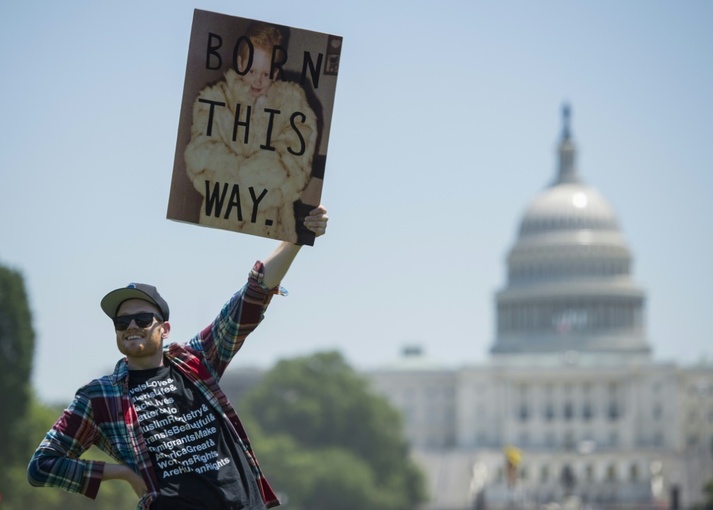
LGBTQ candidates are running in all 50 US states and the capital Washington for the first time in this year's midterm election, as the community becomes an increasingly powerful voting constituency.. Among a host of other firsts that the LGBTQ community is eyeing on election night, Vermont House candidate Becca Balint would be the only lesbian ever sent by the state to Congress.
LGBTQ candidates are running in all 50 US states and the capital Washington for the first time in this year's midterm election, as the community becomes an increasingly powerful voting constituency.
The milestone comes amid a surge in gay and transgender voters that analysts expect to redraw the electoral landscape over the next generation, nudging the conservative US heartland in a more liberal direction.
A new report from the LGBTQ Victory Fund found that of the 1,065 LGBTQ hopefuls who ran primary campaigns for November's midterms, a historic 678 made it onto the ballot -- an 18 percent increase over 2020.
"Voters are sick and tired of the relentless attacks lobbed against the LGBTQ community this year," said Annise Parker, a former Houston mayor who heads the LGBTQ Victory Fund.
"Bigots want us to stay home and stay quiet, but their attacks are backfiring and instead have motivated a new wave of LGBTQ leaders to run for office."
Almost 90 percent of the LGBTQ candidates who entered this year's primary races are Democrats like Maura Healey and Tina Kotek, who are vying to become the nation's first lesbian governors in Massachusetts and Oregon.
- 'Relentless attacks' -
Healey is comfortably ahead in her race, but Kotek finds herself just behind in a contest regarded as a toss-up.
Among a host of other firsts that the LGBTQ community is eyeing on election night, Vermont House candidate Becca Balint would be the only lesbian ever sent by the state to Congress.
Mary Louise Adams, an award-winning author and academic who specializes in LGBTQ issues, welcomed progress in the drive to ensure that members of the community "not just present but visible and vocal" in public life.
"As a voter, I would still be more interested in knowing what the candidates' overall platforms are and what strategies they propose to strengthen and support marginalized communities of all kinds," the professor at Queen's University in Canada told AFP.

The candidate statistics were hailed as significant progress during a year in which state lawmakers have proposed a record 340-plus anti-LGBTQ bills, according to the Human Rights Campaign (HRC) -- the country's largest gay rights group.
Much of the legislation seeks to ban transgender children from playing sports in categories that correspond with their stated gender or allowing performances in schools involving drag acts.
"The most anti-transgender state legislative package in history was passed this year in Alabama and the increased focus on attacking youth is truly alarming," said Cathryn Oakley, HRC's state legislative director.
"It also speaks to our opponents' desperation. Public opinion has moved so far in the direction of equality that they are forced to try to make people afraid of children."
- 'A singular moment' -
The legislative crackdown has extended from grassroots politics to the US Congress, where House Republicans are proposing their own bans on public discussion of gender identity and sexual orientation.
Florida's controversial "Don't Say Gay" law outlaws lessons on the topics in kindergarten through third grade.
But the federal bill goes further, curbing such discussion at events and in literature in any government building.
LGBTQ Americans are set to become one of the fastest growing voting blocs, according to HRC, growing at a "scale, scope and speed that will fundamentally reshape the American electoral landscape."
The community accounts for an estimated one in 10 voters but that figure is expected to rise to one in seven by the end of the decade, the lobby group said in a report released in October with Bowling Green State University in Ohio.
"Historic moments like these can be a sign that people have become more comfortable with LGBTQ leaders in political office who are making decisions on behalf of the public," said Julia Himberg, author of "The New Gay for Pay: The Sexual Politics of American Television Production."
"Moments like these can even contribute to broader social and institutional change."
The professor, who teaches film and media studies at Arizona State University, warned against drawing broad conclusions from one election, however.
"Systemic change takes time and intention. So we need to be cautious about big proclamations," she told AFP.
"This election cycle is pivotal but it is also a singular moment that in fact may not go beyond this moment."
ft/sw/st
© Agence France-Presse
Much of the legislation seeks to ban transgender children from playing sports in categories that correspond with their stated gender or allowing performances in schools involving drag acts.
"The most anti-transgender state legislative package in history was passed this year in Alabama and the increased focus on attacking youth is truly alarming," said Cathryn Oakley, HRC's state legislative director.
"It also speaks to our opponents' desperation. Public opinion has moved so far in the direction of equality that they are forced to try to make people afraid of children."
- 'A singular moment' -
The legislative crackdown has extended from grassroots politics to the US Congress, where House Republicans are proposing their own bans on public discussion of gender identity and sexual orientation.
Florida's controversial "Don't Say Gay" law outlaws lessons on the topics in kindergarten through third grade.
But the federal bill goes further, curbing such discussion at events and in literature in any government building.
LGBTQ Americans are set to become one of the fastest growing voting blocs, according to HRC, growing at a "scale, scope and speed that will fundamentally reshape the American electoral landscape."
The community accounts for an estimated one in 10 voters but that figure is expected to rise to one in seven by the end of the decade, the lobby group said in a report released in October with Bowling Green State University in Ohio.
"Historic moments like these can be a sign that people have become more comfortable with LGBTQ leaders in political office who are making decisions on behalf of the public," said Julia Himberg, author of "The New Gay for Pay: The Sexual Politics of American Television Production."
"Moments like these can even contribute to broader social and institutional change."
The professor, who teaches film and media studies at Arizona State University, warned against drawing broad conclusions from one election, however.
"Systemic change takes time and intention. So we need to be cautious about big proclamations," she told AFP.
"This election cycle is pivotal but it is also a singular moment that in fact may not go beyond this moment."
ft/sw/st
© Agence France-Presse
These 10 LGBTQ candidates could make political history in November
Matt Lavietes
October 23, 2022
More than 600 lesbian, gay, bisexual, transgender and queer candidates will be on the ballot Nov. 8 — up from the 432 candidates in the previous midterm elections in 2018 — according to the political action committee LGBTQ Victory Fund.
Dozens of these political hopefuls, including the 10 highlighted below, will have the opportunity to make history.
Becca Balint

Vermont state Sen. Becca Balint, who is seeking the Democratic Party nomination to run for Vermont's vacant U.S. House seat, speaks to voters in Colchester on July 24, 2022. (Wilson Ring / AP file)
Running for: U.S. House of Representatives, Vermont's At-Large Congressional District
If elected, would be the first: Woman and LGBTQ person elected to Congress from Vermont
Becca Balint, a former middle school teacher, is no stranger to political firsts for Vermont's women and for the LGBTQ community. In 2020, Balint became the first woman and first openly LGBTQ person to serve as the Vermont Senate president.
But even as an LGBTQ political leader, Balint, who is a lesbian, has faced pushback for her sexuality. In a campaign video, Balint said that when she and her now-wife first moved into their house in Brattleboro, their neighbor had an anti-gay sign.
"I get out of the car, and I'm pregnant, and at that moment, I felt like 'How are we going to make this work?'" she said. "From a wave to a conversation to a borrowed lawn mower, things changed and the sign came down, and we felt the relief that comes when we stop turning away from each other and start meeting each other face to face."
Balint, 54, won her Democratic primary against Lt. Gov. Molly Gray with the backing of progressives like Sen. Bernie Sanders, I-Vt., and Vermont icons Ben Cohen and Jerry Greenfield, the co-founders of Ben & Jerry’s ice cream.
She is heavily favored to win against her Republican opponent, Iraq War veteran Liam Madden, in November. Vermont has not sent a Republican to Congress since the re-election of former U.S. Sen. Jim Jeffords in 2000.
Currently, Vermont is the only state in the country to have never sent a woman to Congress. That could, of course, change if Balint wins.
Robert Garcia
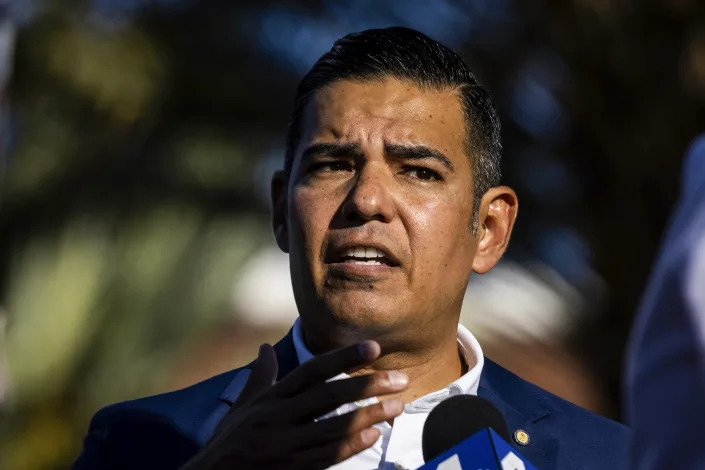
Long Beach Mayor Robert Garcia in Long Beach, Calif., on Sept. 13, 2021.
Eric Sorensen
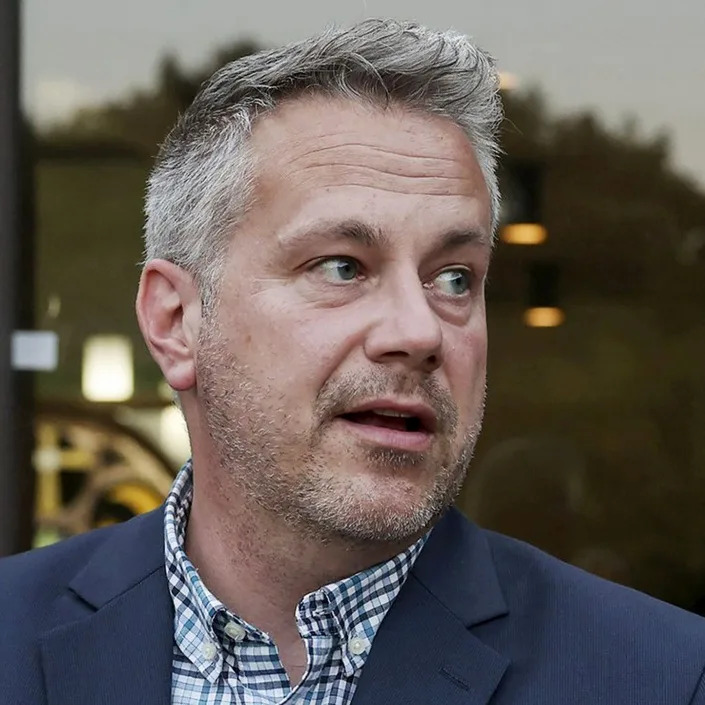
Democrat Eric Sorensen. (John J. Kim / Chicago Tribune via Getty Images file)
Running for: U.S. House of Representatives, Illinois' 17th Congressional District
If elected, would be the first: LGBTQ person elected to Congress from Illinois
Before entering the political arena this year, Eric Sorensen spent 22 years as a weather forecaster in Illinois. His victory would make him the first meteorologist elected to Congress in more than 50 years, at a time when federal lawmakers are increasingly challenged with helping the nation avert the worst effects of climate change.
"There is not a single climate communicator in Congress who matches the communication and climate science backgrounds of Eric," Sorensen's campaign website reads.
Maura Healey
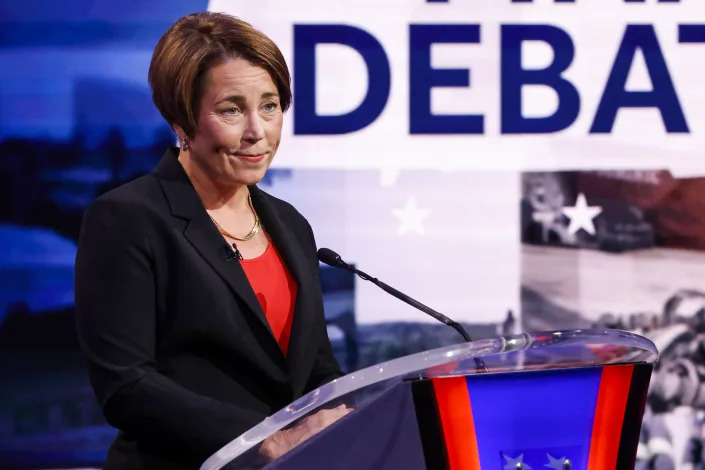
Massachusetts gubernatorial candidate Maura Healey faces Geoff Diehl at their final debate in Needham on Oct. 20, 2022. (Carlin Stiehl / The Boston Globe via AP, Pool)
Running for: Governor of Massachusetts
If elected, would be the first: Lesbian governor in the U.S.
Maura Healey has a long history of shattering glass ceilings for the country’s LGBTQ community.
In 2009, Healey, who is now the Massachusetts attorney general, led the nation’s first successful challenge to the Defense of Marriage Act, a 1996 law that prohibited federal recognition of same-sex marriages. And in 2014, she broke barriers again, becoming the nation’s first out lesbian to be elected state attorney general.
“If I can be someone who represents and also gives others the belief that they can be anything they want to be and do anything they want to do, regardless of race, gender, identity, religion, that’s where I want to be,” Healy, 51, recently told NBC News. “That’s something I take seriously, and I think that’s what other LGBTQ+ leaders do as well — recognizing that we’re not just in a vacuum.”
If Healy wins as expected against her Republican opponent, former state representative Geoff Diehl, who was endorsed by former President Donald Trump, she’ll also become her state’s first elected female governor.
Tina Kotek
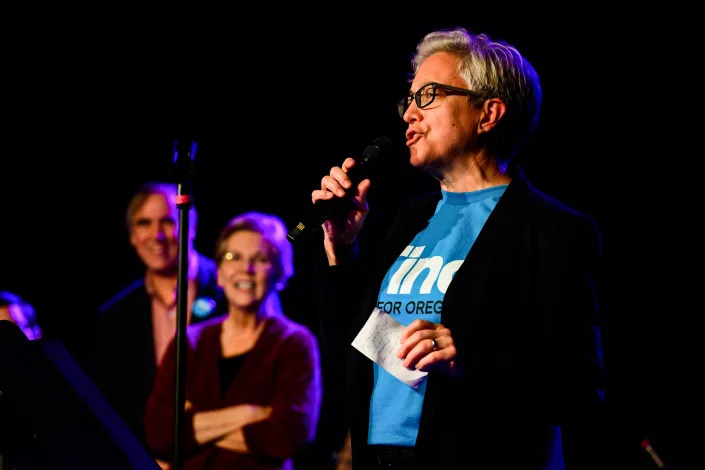
Democratic gubernatorial candidate Tina Kotek holds a rally on Oct. 22, 2022, in Portland, Ore. (Mathieu Lewis-Rolland / Getty Images)
Running for: Governor of Oregon
If elected, would be the first: Lesbian governor in the U.S.
Tina Kotek, like Healey, has also been a breaker of glass ceilings. In 2013, Kotek became the country’s first out lesbian speaker of a state House of Representatives. She made history again by becoming Oregon’s longest-serving House speaker, before stepping down in January to run for governor.
For Kotek, a Democrat, the odds of success in November are less promising than Healey’s. Kotek not only faces Republican Christine Drazan, the former minority leader of the Oregon House, but also a third-party candidate, Betsy Johnson, who recent polling suggests is dividing Democratic voters.
Erick Russell
Running for: Connecticut Treasurer
If elected, would be the first: Black LGBTQ statewide elected official in the U.S.
Erick Russell was born and raised in New Haven, Connecticut, where he currently resides with his husband, Chris. Russell earned both his bachelor's and law degrees in the state, receiving his undergraduate degree in criminal justice from the University of New Haven and his J.D. from the University of Connecticut School of Law.
He is currently a partner at a Connecticut law firm, where, according to his campaign website, his practice focuses on "representing municipalities, state agencies and the state in financing critical infrastructure projects, such as schools, affordable housing, child care facilities, and transportation infrastructure, managing debt and restructuring pension obligations."
Celia Israel
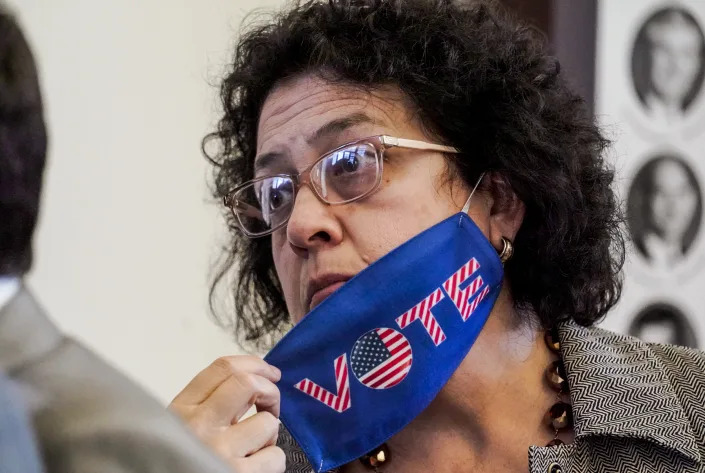
State Rep. Celia Israel, D-Austin, listens to fellow lawmakers in the House Chamber in Austin on May 6, 2021. (Eric Gay / AP file)
Running for: Mayor of Austin, Texas
If elected, would be the first: LGBTQ mayor of Austin and the first Latina mayor of a major U.S. city
Celia Israel currently represents District 50 in the Texas House of Representatives. Throughout her roughly eight years as a state representative, Israel, who is a lesbian, helped found the Texas House LGBTQ Caucus, was named a "Champion of Equality" by Equality Texas and was inducted into the Austin Women’s Hall of Fame.
Jennie Armstrong
Running for: Alaska House of Representatives, District 16
Andrew Gray
Posted by Andrew Gray for State House on Tuesday, August 9, 2022
Running for: Alaska House of Representatives, District 20
If elected would be the first: LGBTQ state lawmaker(s) in Alaskan history.
Alaska is one of four states with zero out LGBTQ state lawmakers, according to the LGBTQ Victory Fund.
“For far too long, Alaska’s LGBTQ community has lacked representation in the state legislature — and they have the wounds to show for it,” Parker of the LGBTQ Victory Fund said in a statement after endorsing Armstrong and Gray. “It is critical the LGBTQ community and our allies unite behind exceptional LGBTQ leaders like Jennifer and Andrew who have the grit and experience to fight for and defend our freedoms.”
Armstrong, a small business owner who is pansexual, and Gray, a former member of the Alaska National Guard who is gay, are both political newcomers and parents.
Matt Lavietes
October 23, 2022
More than 600 lesbian, gay, bisexual, transgender and queer candidates will be on the ballot Nov. 8 — up from the 432 candidates in the previous midterm elections in 2018 — according to the political action committee LGBTQ Victory Fund.
Dozens of these political hopefuls, including the 10 highlighted below, will have the opportunity to make history.
Becca Balint

Vermont state Sen. Becca Balint, who is seeking the Democratic Party nomination to run for Vermont's vacant U.S. House seat, speaks to voters in Colchester on July 24, 2022. (Wilson Ring / AP file)
Running for: U.S. House of Representatives, Vermont's At-Large Congressional District
If elected, would be the first: Woman and LGBTQ person elected to Congress from Vermont
Becca Balint, a former middle school teacher, is no stranger to political firsts for Vermont's women and for the LGBTQ community. In 2020, Balint became the first woman and first openly LGBTQ person to serve as the Vermont Senate president.
But even as an LGBTQ political leader, Balint, who is a lesbian, has faced pushback for her sexuality. In a campaign video, Balint said that when she and her now-wife first moved into their house in Brattleboro, their neighbor had an anti-gay sign.
"I get out of the car, and I'm pregnant, and at that moment, I felt like 'How are we going to make this work?'" she said. "From a wave to a conversation to a borrowed lawn mower, things changed and the sign came down, and we felt the relief that comes when we stop turning away from each other and start meeting each other face to face."
Balint, 54, won her Democratic primary against Lt. Gov. Molly Gray with the backing of progressives like Sen. Bernie Sanders, I-Vt., and Vermont icons Ben Cohen and Jerry Greenfield, the co-founders of Ben & Jerry’s ice cream.
She is heavily favored to win against her Republican opponent, Iraq War veteran Liam Madden, in November. Vermont has not sent a Republican to Congress since the re-election of former U.S. Sen. Jim Jeffords in 2000.
Currently, Vermont is the only state in the country to have never sent a woman to Congress. That could, of course, change if Balint wins.
Robert Garcia

Long Beach Mayor Robert Garcia in Long Beach, Calif., on Sept. 13, 2021.
(Brian Feinzimer / Sipa USA via AP file)
Running for: U.S. House of Representatives, California's 42nd Congressional District
If elected, would be the first: LGBTQ immigrant elected to Congress
Robert Garcia is an example of how intersectionality can translate into political success. At 36-years-old, Garcia was elected mayor of Long Beach, California, in 2014, becoming the city's youngest, first LGBTQ and first Latino person to assume the office he stills holds today.
Garcia, a Democrat, has also had various political identities over his lifetime. While attending college at California State University, Long Beach, Garcia served as the president of his school's Long Beach Young Republicans club.
He previously told NBC News that his Republican political affiliation was a result of his family's affection for former President Ronald Reagan. Garcia's family members, who are originally from Peru, were among the millions of immigrants who applied for citizenship after Reagan signed the Immigration Reform and Control Act of 1986.
“My worldview and politics haven’t changed much. But with immigrants rights and the war, and me being gay, we all realized that we were more progressive,” Garcia said, adding that his family has since switched parties.
Jamie McLeod-Skinner

Democrat Jamie McLeod-Skinner speaks at a debate with Republican Lori Chavez DeRemer for Oregon's 5th Congressional District in Lake Oswego, Ore., on Oct. 17, 2022. (Steve Dipaola / AP)
Running for: U.S. House of Representatives, Oregon's 5th Congressional District
If elected, would be the first: LGBTQ person elected to Congress from Oregon
In a political upset, Democrat Jamie McLeod-Skinner, a small-business owner who had unsuccessfully run for Congress in 2018, defeated seven-term Rep. Kurt Schrader in this year's Democratic primary.
"For far too long, Oregon’s LGBTQ community has not had a voice in Congress," Annise Parker, president of the LGBTQ Victory Fund, said in a statement following McLeod-Skinner's primary win. "With anti-LGBTQ attacks spreading like wildfire and lawmakers in Congress bent on outlawing abortion and reproductive health care, her election could not come at a more critical moment in our nation’s history.”
In her primary, McLeod-Skinner ran mainly as a progressive alternative to Schrader. Schrader voted against the $1.9 trillion pandemic relief bill and helped topple a drug pricing plan in President Joe Biden's Build Back Better bill. Schrader also referred to former President Donald Trump's second impeachment as a "lynching," which he later apologized for.
In the general election, however, McLeod-Skinner's shift to the left may play to her opponent's advantage. Oregon's 5th Congressional District has not elected a Republican since 1994. The Cook Political Report rates the race a “Toss Up."
Running for: U.S. House of Representatives, California's 42nd Congressional District
If elected, would be the first: LGBTQ immigrant elected to Congress
Robert Garcia is an example of how intersectionality can translate into political success. At 36-years-old, Garcia was elected mayor of Long Beach, California, in 2014, becoming the city's youngest, first LGBTQ and first Latino person to assume the office he stills holds today.
Garcia, a Democrat, has also had various political identities over his lifetime. While attending college at California State University, Long Beach, Garcia served as the president of his school's Long Beach Young Republicans club.
He previously told NBC News that his Republican political affiliation was a result of his family's affection for former President Ronald Reagan. Garcia's family members, who are originally from Peru, were among the millions of immigrants who applied for citizenship after Reagan signed the Immigration Reform and Control Act of 1986.
“My worldview and politics haven’t changed much. But with immigrants rights and the war, and me being gay, we all realized that we were more progressive,” Garcia said, adding that his family has since switched parties.
Jamie McLeod-Skinner

Democrat Jamie McLeod-Skinner speaks at a debate with Republican Lori Chavez DeRemer for Oregon's 5th Congressional District in Lake Oswego, Ore., on Oct. 17, 2022. (Steve Dipaola / AP)
Running for: U.S. House of Representatives, Oregon's 5th Congressional District
If elected, would be the first: LGBTQ person elected to Congress from Oregon
In a political upset, Democrat Jamie McLeod-Skinner, a small-business owner who had unsuccessfully run for Congress in 2018, defeated seven-term Rep. Kurt Schrader in this year's Democratic primary.
"For far too long, Oregon’s LGBTQ community has not had a voice in Congress," Annise Parker, president of the LGBTQ Victory Fund, said in a statement following McLeod-Skinner's primary win. "With anti-LGBTQ attacks spreading like wildfire and lawmakers in Congress bent on outlawing abortion and reproductive health care, her election could not come at a more critical moment in our nation’s history.”
In her primary, McLeod-Skinner ran mainly as a progressive alternative to Schrader. Schrader voted against the $1.9 trillion pandemic relief bill and helped topple a drug pricing plan in President Joe Biden's Build Back Better bill. Schrader also referred to former President Donald Trump's second impeachment as a "lynching," which he later apologized for.
In the general election, however, McLeod-Skinner's shift to the left may play to her opponent's advantage. Oregon's 5th Congressional District has not elected a Republican since 1994. The Cook Political Report rates the race a “Toss Up."
Eric Sorensen

Democrat Eric Sorensen. (John J. Kim / Chicago Tribune via Getty Images file)
Running for: U.S. House of Representatives, Illinois' 17th Congressional District
If elected, would be the first: LGBTQ person elected to Congress from Illinois
Before entering the political arena this year, Eric Sorensen spent 22 years as a weather forecaster in Illinois. His victory would make him the first meteorologist elected to Congress in more than 50 years, at a time when federal lawmakers are increasingly challenged with helping the nation avert the worst effects of climate change.
"There is not a single climate communicator in Congress who matches the communication and climate science backgrounds of Eric," Sorensen's campaign website reads.
Maura Healey

Massachusetts gubernatorial candidate Maura Healey faces Geoff Diehl at their final debate in Needham on Oct. 20, 2022. (Carlin Stiehl / The Boston Globe via AP, Pool)
Running for: Governor of Massachusetts
If elected, would be the first: Lesbian governor in the U.S.
Maura Healey has a long history of shattering glass ceilings for the country’s LGBTQ community.
In 2009, Healey, who is now the Massachusetts attorney general, led the nation’s first successful challenge to the Defense of Marriage Act, a 1996 law that prohibited federal recognition of same-sex marriages. And in 2014, she broke barriers again, becoming the nation’s first out lesbian to be elected state attorney general.
“If I can be someone who represents and also gives others the belief that they can be anything they want to be and do anything they want to do, regardless of race, gender, identity, religion, that’s where I want to be,” Healy, 51, recently told NBC News. “That’s something I take seriously, and I think that’s what other LGBTQ+ leaders do as well — recognizing that we’re not just in a vacuum.”
If Healy wins as expected against her Republican opponent, former state representative Geoff Diehl, who was endorsed by former President Donald Trump, she’ll also become her state’s first elected female governor.
Tina Kotek

Democratic gubernatorial candidate Tina Kotek holds a rally on Oct. 22, 2022, in Portland, Ore. (Mathieu Lewis-Rolland / Getty Images)
Running for: Governor of Oregon
If elected, would be the first: Lesbian governor in the U.S.
Tina Kotek, like Healey, has also been a breaker of glass ceilings. In 2013, Kotek became the country’s first out lesbian speaker of a state House of Representatives. She made history again by becoming Oregon’s longest-serving House speaker, before stepping down in January to run for governor.
For Kotek, a Democrat, the odds of success in November are less promising than Healey’s. Kotek not only faces Republican Christine Drazan, the former minority leader of the Oregon House, but also a third-party candidate, Betsy Johnson, who recent polling suggests is dividing Democratic voters.
Erick Russell
Running for: Connecticut Treasurer
If elected, would be the first: Black LGBTQ statewide elected official in the U.S.
Erick Russell was born and raised in New Haven, Connecticut, where he currently resides with his husband, Chris. Russell earned both his bachelor's and law degrees in the state, receiving his undergraduate degree in criminal justice from the University of New Haven and his J.D. from the University of Connecticut School of Law.
He is currently a partner at a Connecticut law firm, where, according to his campaign website, his practice focuses on "representing municipalities, state agencies and the state in financing critical infrastructure projects, such as schools, affordable housing, child care facilities, and transportation infrastructure, managing debt and restructuring pension obligations."
Celia Israel

State Rep. Celia Israel, D-Austin, listens to fellow lawmakers in the House Chamber in Austin on May 6, 2021. (Eric Gay / AP file)
Running for: Mayor of Austin, Texas
If elected, would be the first: LGBTQ mayor of Austin and the first Latina mayor of a major U.S. city
Celia Israel currently represents District 50 in the Texas House of Representatives. Throughout her roughly eight years as a state representative, Israel, who is a lesbian, helped found the Texas House LGBTQ Caucus, was named a "Champion of Equality" by Equality Texas and was inducted into the Austin Women’s Hall of Fame.
Jennie Armstrong
Running for: Alaska House of Representatives, District 16
Andrew Gray
Posted by Andrew Gray for State House on Tuesday, August 9, 2022
Running for: Alaska House of Representatives, District 20
If elected would be the first: LGBTQ state lawmaker(s) in Alaskan history.
Alaska is one of four states with zero out LGBTQ state lawmakers, according to the LGBTQ Victory Fund.
“For far too long, Alaska’s LGBTQ community has lacked representation in the state legislature — and they have the wounds to show for it,” Parker of the LGBTQ Victory Fund said in a statement after endorsing Armstrong and Gray. “It is critical the LGBTQ community and our allies unite behind exceptional LGBTQ leaders like Jennifer and Andrew who have the grit and experience to fight for and defend our freedoms.”
Armstrong, a small business owner who is pansexual, and Gray, a former member of the Alaska National Guard who is gay, are both political newcomers and parents.
No comments:
Post a Comment